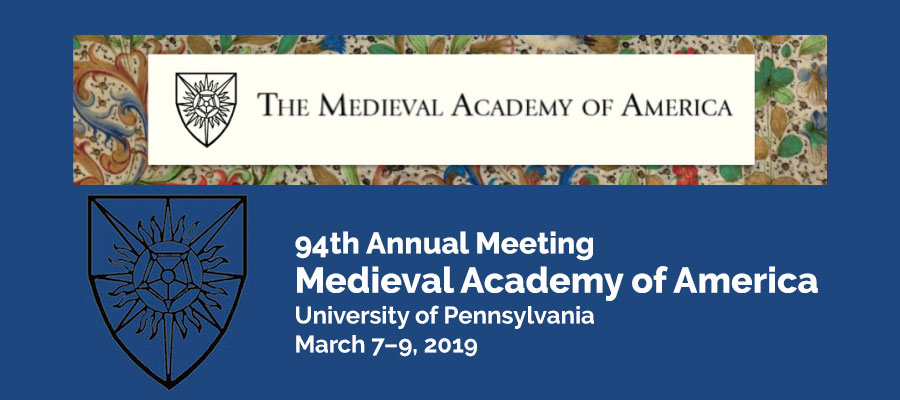94th Annual Meeting of the Medieval Academy of America, University of Pennsylvania, March 7–9, 2019
The 94th Annual Meeting of the Medieval Academy of America will take place in Philadelphia on the campus of the University of Pennsylvania. The meeting is jointly hosted by the Medieval Academy of America, Bryn Mawr College, Delaware Valley Medieval Association, Haverford College, St. Joseph’s University, the University of Pennsylvania, and Villanova University.
The Global Turn in Medieval Studies
Medievalists across various disciplines are taking a more geographically and methodologically global approach to the study of the Middle Ages. While the Organizing Committee invites proposals for papers on all topics and in all disciplines and periods of medieval studies, this year’s conference spotlights the “global turn” in medieval studies. To this end, we encourage session and paper proposals that treat the Middle Ages as a broad historical and cultural phenomenon, encompassing the full extent of Europe as well as the Middle East, southern and eastern Asia, Africa, and beyond. We also invite proposals that explore departures from traditional teleological discourses rooted in national interests, ones that apply disciplinary and interdisciplinary methods to study a broad array of subjects.
We especially encourage proposals that provoke explorations of the following “big questions”:
- Periodization and the drawing of geographic borders in medieval studies can be helpful, but can also limit our ability to make connections, see patterns, or entertain dialogue among specialists in individual sub-fields. What do we mean when we speak of the “Middle Ages” in geographic, temporal, or disciplinary terms? What do we mean when we use contemporary geographical concepts, such as Europe or Asia? What do we mean when we say “Global Middle Ages”? What is in and what is out?
- If we are to turn away from national models, what is an alternative? For instance, how can methodologies that highlight networks further our understanding of the “Global Middle Ages”? How might they contribute, for example, to understanding mechanisms of knowledge sharing and the development and use of religious, economic, and political systems?
- Across all cultures in the medieval world, philosophers, theologians, scholars, healers, poets, artists, and musicians sought to understand the natural world and to apply that understanding to concrete ends. How do we make sense of their efforts? How might traditional paradigms of what we call “science,” philosophical inquiry, literary, and artistic practice be challenged?
- Medieval studies has been at the forefront of the “digital turn” over the past few decades. How have digital approaches to scholarship altered the landscape for better or worse? In a global context, have new technologies broken barriers or created new ones? How do we create and evaluate digital scholarship in medieval studies vis à vis traditional methods?
Within the framework of these “big questions”, the organizing committee proposes the following threads:
- Uses of the Medieval
- Expanding Geographies of the Medieval
- Re-thinking Periodization: Beyond Eurocentrism and Postcolonialism
- Medieval Foundations of Contemporary Politics
- Alexander the Great and World Thinking
- Medieval Cosmologies
- The Trojan Myth and Genealogies
- What is Medieval/European/Literature?
- Transmission and Technologies of Knowledge
- Doing Science at Court
- The Locations of Learning
- Myths and Legends of Languages and Letters
- Dante, Local and Global: Towards 2021
- Deconstructing “National” Legal Traditions
- Gender Matters
- Ars/Arts: Intersections Across Disciplines and Borders
- Global Manuscript Markets and Movements
- Digitizing the Global Middle Ages: Practices, Sustainability, and Ethics
- Approaches to Historiography
- Interfaith Encounters, Real and Imagined
- Religious and Cultural Ethics across Cultures: Conversation or Confrontation?
- Saints and Sages
- Words and Music
Individuals may propose a:
- single paper for a listed thread
- full session on a listed thread
- single paper not designated for a specific thread
- full session on a topic outside the listed threads
- poster, paper, full session, or workshop that explores the role and uses of digital technologies
